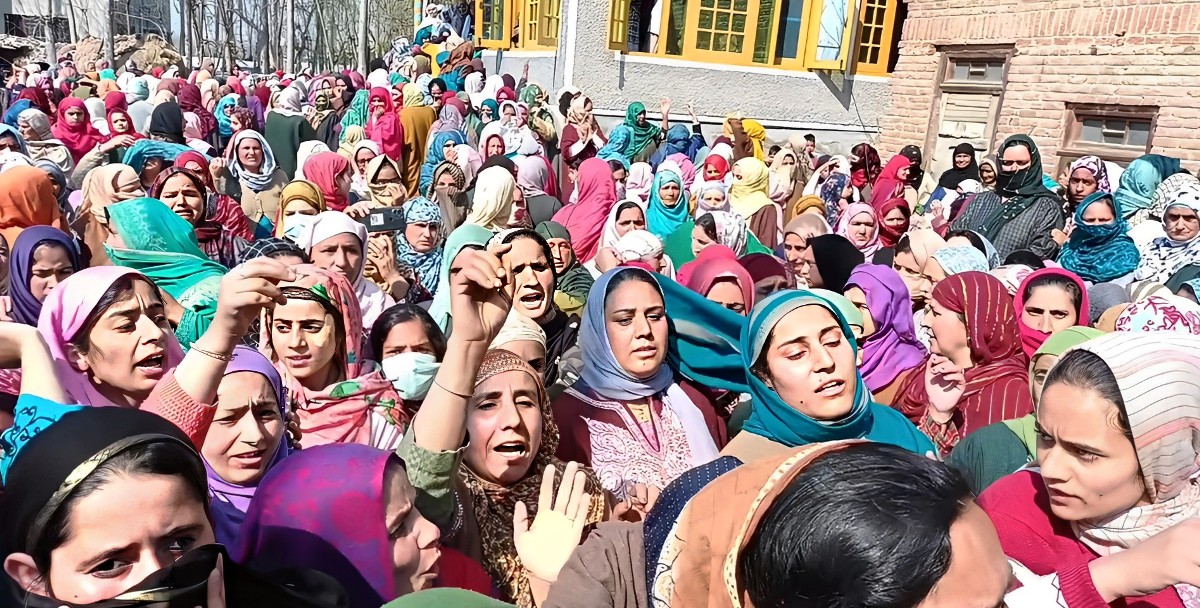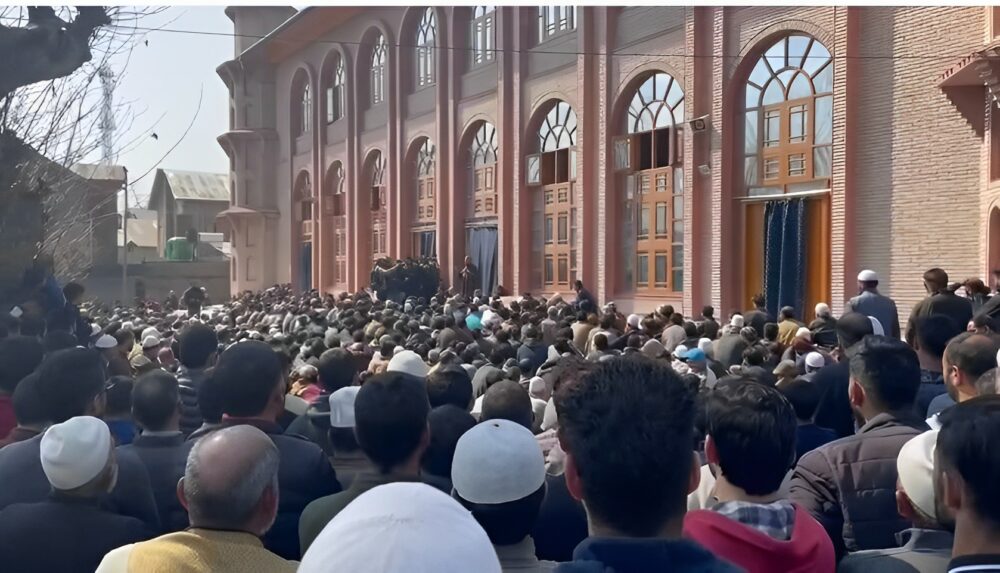A chain of violent incidents within families and relationships dominated the first half of March. These crimes may have something to do with disturbed minds that get some kind of mania with the seasonal shift, Daanish Bin Nabi and Faiqa Masoodi reports
On March 14, 2023, when the people were about to retire for the night, a shocking report started trending on the internet: Zubair Ahmad Ganie was stabbed by his brother-in-law in the Narakara area of Budgam. Since the report came within two days after the goriest of the murders from the same district, it was expected to attract many eyeballs.
March witnessed a series of shocking events, mostly taking place within the relationships. Though incidents of this kind were not uncommon, it was the serial happening, if not interesting.
On March 1, 2023, a group of boys and a girl were crossing the bridge on Jhelum at Dewan Bagh and then there was a commotion. A boy and a girl jumped into the river. “The boy had attempted to get the girl out of the river,” one young boy, who attempted to rescue the boy, said on the video. “He pushed the girl towards the banks and then started sinking himself. I jumped to get him out but he almost disappeared.” The girl survived but the boy, Sahil Parray of Sangri died. They were distant relatives. Did the two jump into the river to commit suicide or did the girl jump and the boy attempted to rescue her? Were they in a relationship? These questions remain.
Jammu woke up to a shocking murder of a 27-year-old dentist on March 8, 2023, who was found stabbed to death at her male friend’s Janipur flat. Classmates at a dental college in Kunjwani’s Sehora area in 2016, the girl had enrolled for a master’s degree in Delhi, unlike the boy.
Police said they received a call from the boy’s relatives that he had made it public that he will kill himself. Police went to check and found the door of the flat locked. They broke it open and saw the young dentist dead with a lot of stabbing wounds. They located the killer boy in his bathroom, also seriously injured.
Boy was evacuated to the hospital with serious injuries and a case of murder was registered against him. Given the boy was a Muslim and the victim was a Hindu, the shocking event found a lot of space in right-wing media. There were even symbolic protests of introducing the love jihad slogan in Jammu. Reports suggest the duo were in a relationship and had fought over some issues.
Two days later, on March 9, a young woman from Amritsar living on rent in Srinagar’s Jawahar Nagar, stabbed her husband, Rakesh Kumar using the kitchen knife. The daytime helped him quickly move to the hospital and survive.
The same day murder was reported in a Budgam village. What began as a heated argument between two individuals quickly turned violent, resulting in one person sustaining severe injuries. The injured succumbed well before medical assistance could arrive. Identified as Kaisar Yousaf Zargar, son of Mohammad Yousuf Zargar, a resident of Kuzweera Budgam, the police quickly started investigations. They arrested Abid Hussain Dar, a resident of Nasrullah Pora. “Both of them were interested in the same girl,” SSP Budgam, Tahir Gilani told reporters. “This created an enmity between them and they got into an argument and scuffle as a result of which one of them died.”
A Gory Murder
The worst, however, came on March 12, morning when Budgam police conveyed to a Soibug resident that his daughter’s body has been recovered piece-by-piece from four different spots. Missing since March 7, when she had gone for a computer coaching class but never returned, her body was chopped into pieces and buried at four different places – head in the killer’s courtyard, arms in a water tank, trunk near the Sebdan railway bridge.
Of many suspects, SSP Budgam Tahir Geelani said, they focused on a tile mason as the main suspect. A resident of Mahandpora, almost 4 km away from Soibug, Shabir Wani had been to the victim’s home for work. He proved a hard nut for many days and finally spilt the beans on March 11 evening. On the information he disclosed, police collected the body parts, conducted an autopsy and handed it over to the family for burial. Wani had used a sharp knife to kill the young lady, who was supposed to get married in August to a person of her choice.
The gory murder triggered massive protests in the area and a demand for Wani’s head. While the murder case is solved, the motive is not public.
State of Mind
The chain of events lacks a plausible explanation. However, psychiatrists believe that the spring brings in a sort of strange melancholy with it, to the extent, that some people having different mind issues resort to the unthinkable. Even suicides go up.
“There is a seasonal affective disorder due to the gloomy winter season. We find high quantities of depression this season which gives an increase to the hypomanic symptoms in a psychiatric patient,” Prof Junaid Nabi said. “Hypomanic symptoms lead to inflated self-esteem, and aggression and one feels more energetic. These are the triggering points for a psychiatric patient. With all this, the patient starts to feel more powerful which leads to these crimes.”

Junaid said there is “an obvious connection” between the spring and the increase in the crime rates and the trend is not endemic to Jammu and Kashmir alone.
Even astrologers think on similar terms. “During the spring season some of the planets combust and the energy gets released anti-clockwise leading to adrenaline rush in many people, which gives rise to self-confidence and adversely affects the people with psychiatric problems,” astrologer Rehmat Bashir said. “When house number eight is occupied by Moon and Mars the house malefic releasing all the negative energy which leads to suicide and other crimes in a person.”
Earliest Studies
Astrology apart, the weather conditions have been playing havoc with mood. The first grand study that was published from Kashmir on seasonal mood disorders was published way back in 1988. Based on maniac depressive psychoses – a mental health condition that causes extreme mood swings including emotional highs (mania or hypomania) and lows (depression) between 1970 and 1975, the study established the mess that Kashmir was witnessing at the end of winter in a section of people. This was the second study in the world literature on this subject.
“The peak incidence for mania was noticed in summer while the highest incidence of depression occurred in late winter and spring,” Dr Mushtaq A Margoob, the lead author of the study,10-15 Years Retrospective Study of 50 Patients of MDP for Seasons Variations, wrote. “The highest number of manic attacks 94 (37.9 per cent) occurred in summer only which is in agreement with the findings of Myer and Davis (1978) who also reported summer peaking for mania in England and Wales. The highest number of depressive attacks 39 (33.6 per cent) occurred in spring whereas Parker and Walter (1982) reported the highest incidence of depression in late winter.”

“By now, it is established that all these homicides and suicides could be a reflection of the underline brain chemical imbalance in winter, in particular depletion or deficiency of serotonin, the predominant neurotransmitter connected with our mood, happiness, and impulse control,” Dr Margoob said. “This deficiency predisposes to suicidal or homicidal behaviour, which might reflect the same mechanism underlined in the process of unfortunate events that Kashmir witnessed in recent days.”
Dr Margoob pointed out that seasonal tensions coupled with other environmental concerns, which might have triggered such impulsive behaviour. “In 2006, World Health Organisation (WHO) had ranked depression as the fourth among the list of the most urgent health problems worldwide and had predicted it to become number two in terms of disease burden by 2020 overriding diabetes, cancer, arthritis and other diseases,” he said. “The crisis in Kashmir is that it has already got it much earlier because of the massive depression load.”
Now Dr Margoob asserted that Kashmir is in a phase where transgenerational transmission of trauma and depression is in progress. “You have depression overload, you have a vulnerable generation, you have drugs around and there is a viable ecosystem and this is pushing things to the new generation,” he said.















